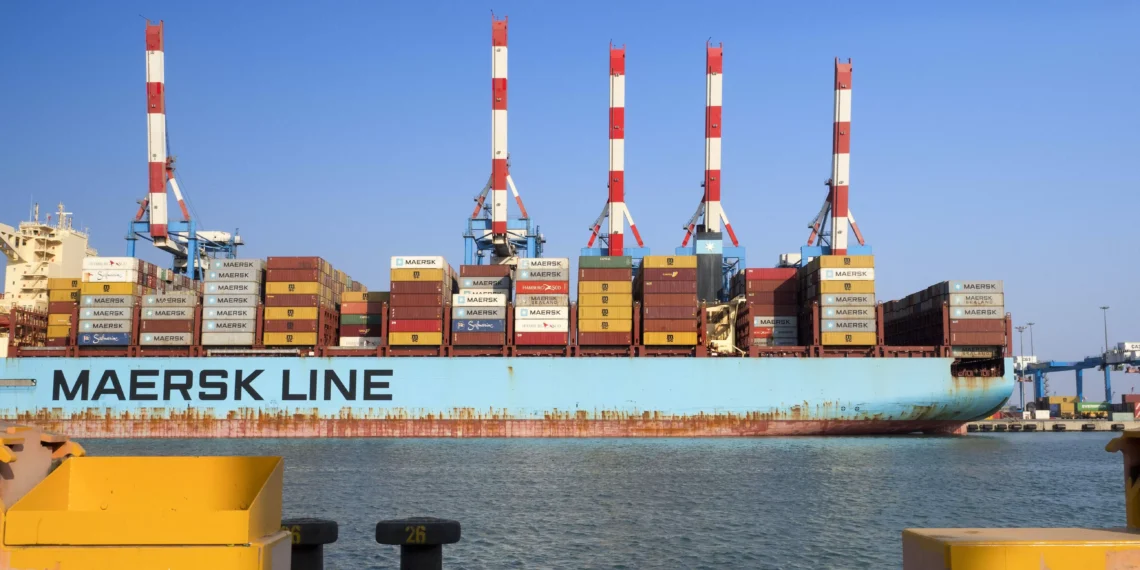In recent years, the role of Danish shipping giant Maersk has come under scrutiny for its involvement in delivering military goods to Israel. A team of researchers has revealed that Maersk has violated a Spanish embargo on sending military goods to Israel, raising questions about the company’s ethical and moral responsibilities.
The Intercept, a renowned investigative news organization, has published an in-depth report on the matter, shedding light on Maersk’s actions and their impact on the Israeli-Palestinian conflict. The report has sparked a global conversation about the role of corporations in perpetuating violence and conflict.
According to the researchers, Maersk has been transporting military goods to Israel, including armored vehicles, despite a Spanish arms embargo on the country. This embargo was put in place due to the ongoing human rights violations and violence in the region. By violating this embargo, Maersk has not only disregarded international law but has also contributed to the suffering of innocent civilians.
Maersk’s involvement in the Israeli-Palestinian conflict is not a recent development. The company has a long history of transporting military goods to Israel, even during times of heightened tensions and violence. This raises serious questions about the company’s values and priorities. While Maersk claims to be a responsible and ethical business, its actions tell a different story.
The revelation of Maersk’s violations has sparked outrage among human rights activists and pro-Palestinian organizations. They have called for an immediate halt to the company’s involvement in the transport of military goods to Israel. Many have also called for a boycott of Maersk and its services until the company takes responsibility for its actions and commits to upholding international law.
Maersk, on the other hand, has denied any wrongdoing and has stated that it follows all applicable laws and regulations. The company also claims that it does not have control over the contents of the containers it transports, and it is the responsibility of the shippers to ensure that their cargo complies with all laws and regulations.
However, this excuse does not hold up under scrutiny. As a global shipping giant, Maersk has the resources and capabilities to thoroughly screen the contents of its containers. It is also the duty of the company to ensure that its services are not being used for unethical or illegal purposes. By turning a blind eye to the contents of its containers, Maersk is complicit in the violation of international law.
The Intercept’s report has also shed light on Maersk’s close ties with the Israeli government. The company has been praised by Israeli officials for its role in delivering military goods to the country. This raises concerns about the potential influence of politics and profit on Maersk’s actions. It is essential for companies to prioritize human rights and ethical practices over political and financial gains.
The impact of Maersk’s actions on the Israeli-Palestinian conflict cannot be ignored. The continued flow of military goods to Israel only serves to perpetuate the cycle of violence and suffering in the region. Innocent civilians, especially Palestinians, bear the brunt of this violence, and Maersk must take responsibility for its role in it.
Furthermore, Maersk’s actions have also damaged its reputation as a responsible and ethical business. The company’s involvement in the Israeli-Palestinian conflict has raised serious questions about its values and priorities. This could have serious consequences for its business operations and partnerships in the future.
In light of these revelations, it is imperative for Maersk to take immediate action. The company must commit to upholding international law and ethical practices in all its operations. This includes thoroughly screening the contents of its containers and ensuring that they do not violate any laws or regulations. Maersk must also take responsibility for its past actions and make amends for its involvement in the Israeli-Palestinian conflict.
In conclusion, the role of Maersk in delivering military goods to Israel has come under scrutiny, and for good reason. The company’s actions have violated international law and contributed to the ongoing violence and suffering in the region. It is time for Maersk to take responsibility for its actions and prioritize ethical practices over political and financial gains. Only then can it truly live up to its reputation as a responsible and ethical business.






